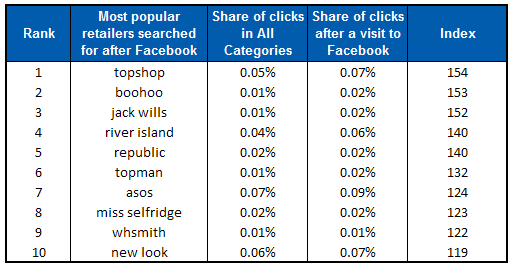Hitwise data reveals the importance of Facebook marketing for online retailers
In a recent post Robin Goad of Hitwise reminds that "Facebook is the second most visited website in the UK after Google and is now the second biggest source of traffic to other websites as well. 1 in every 6 page views from UK Internet users goes to a Facebook page, and 20 million hours are spent on the website every day from UK users alone."
So far, so good - we know Facebook is big! There's no question of the importance of social media, content and inbound marketing, with Facebook being an important part of that ecosystem. The Hitwise research data stresses the value of Facebook for multi-channel marketers. According to Hitwise, the same names are dominating - Topshop, ASOS etc - the majority being own or one-brand online retailers.
The context here is that Hitwise are launching a new service called the 'Facebook Fan Acquisition and Analysis service' and they're keen to promote those benefits with statistics that can help us better understand what the ROI is. Great, so what we can take from this insight?
Well looking at the headline figures is dangerous I think (lies, damned lies, etc). Particularly when it's reported out of context. For example, Search Engine Land picked up this story and presented it definitively using this graphic and presented it as fact without discussing the methodology or even the time period (it's per one month we think):

The danger is in the statistics vs the conclusions drawn
As the comments made on the Hitwise blog suggest the 1:20 inference is tenuous. Hitwise stress that we're looking at the most active in Facebook yet the numbers simply don't stack up in terms of the linear conclusions drawn if we're trying to evaluate ROI:
- The top online retailers can expect an avg of 62,000 visitors per month when they have zero fans (so, 0 fans = 62,000 visitors)
- WHSmith are the notable exception, not because they're a non-fashion retailer in the top 10 - but because they have 562 fans compared to New Looks 1m or Miss Selfridges 800k, the two businesses that sandwich WHSmith's position. They do no marketing in Facebook that I can see, so go figure!
- Topshop (1.5m Likes), Boohoo (41k Likes) and Jack Wills (249k Likes) lead the pack, with consumers being 54% more likely to search for the ‘Topshop’ brand after a visit to Facebook than they would in a normal everyday search in Google, Yahoo! or Bing. We're to assume this is because of what Topshop do?

What we think
- There is no evidence of the 20 web visits for every like, which feels high. Is that average data for the "top 10 retailers" or what any of us might expect?
- The conclusions being drawn are hasty, it appears to assume people are on an informed linear journey when evidence suggest most people are just seeking entertainment or information when online [see the rft index] i.e 19 year old girl access Facebook from her phone whilst killing some time, then pops on to Topshop to check the latest offer - is that Facebook marketing, the fact she get's emails from Topshop and saw that before Facebook, or is it where she spends her money for clothing and they're simply 'top of mind'
- Facebook Likes or doing any Facebook marketing are not a directly related indicator of direct traffic, brand popularity or searches after Facebook. The data serves only to prove that investing in building a brand and a strong product means you "front of mind" for the consumer. Facebook has much to leverage here, and they're one place where your consumer could be (probably are!)
Given Facebook has become such a ubiquitous tool, are we being too hasty in drawing direct relationships from its use and subsequent brand traffic or brand searches. I think so - what do you think?








